Coordination of prior authorization for TPN
Understanding the Core Aspects of TPN Prior Authorization
Total Parenteral Nutrition (TPN) is a specialized medical treatment providing complete nutritional support intravenously, predominantly used for patients with severe gastrointestinal impairments. Proper coordination of prior authorization (PA) is critical to ensure timely access to essential nutrients while adhering to regulatory and policy standards. This article explores the step-by-step process, coverage criteria, required documentation, and regulatory frameworks involved in securing prior authorization for TPN.
Process and Procedures for Coordinating Prior Authorization for TPN
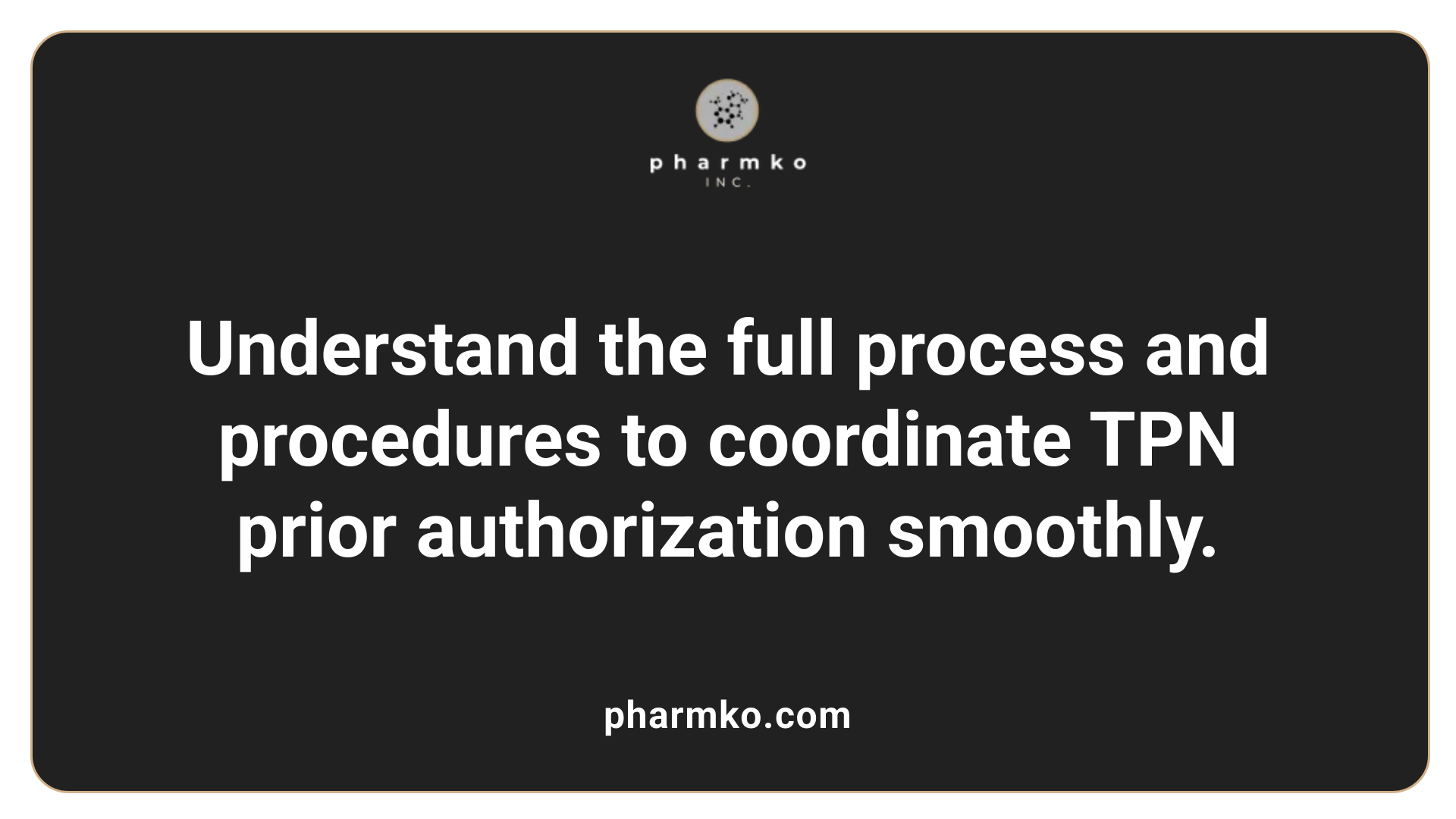
What is the process and procedure for coordinating prior authorization for TPN?
The process for managing prior authorization (PA) for Total Parenteral Nutrition (TPN) is designed to ensure that only patients meeting specific medical criteria receive coverage. Providers initiate this process by submitting a detailed request form through approved channels. These channels include secure online portals such as CoverMyMeds or Surescripts, or via fax, depending on the patient's insurance formulary and provider preferences.
When preparing a request, it is essential to include comprehensive medical documentation that demonstrates the patient's clinical need. This includes evidence of structural or functional gastrointestinal impairment, failure of enteral nutrition attempts, and relevant lab data such as serum albumin levels. The provider must also include history and physical reports, hospital discharge summaries, and any relevant diagnostic tests like small bowel motility studies.
Upon receipt, the request is reviewed by an independent pharmacy benefits manager (PBM). The PBM assesses whether the submitted documentation meets the established medical necessity criteria. These criteria are formulated and endorsed by the Pharmacy and Therapeutics Committee and include conditions like Crohn’s disease, short bowel syndrome, fistulae, CNS disorders impacting swallowing, and severe malnutrition.
Coverage is typically authorized initially for a period of up to 60 days. For continued use beyond this period, the request must be reevaluated, and if necessary, approved by the Medical Director, especially when extending approval to six months or longer. Providers should be prepared to submit supporting physician statements verifying ongoing safety and caregiver training and assessment.
Specifically, for outpatient TPN, the provider must verify that the patient’s condition warrants home infusion therapy, including documentation that oral and enteral nutrition methods have failed or are insufficient. Emergency requests can be expedited with urgent documentation, with decisions made within 48 hours.
Throughout this process, clear communication and thorough documentation are crucial. Providers are advised to regularly check for updates through online portals or direct contact with the PA unit to ensure timely approvals for ongoing treatment.
Ensuring clinical documentation meets medical necessity criteria
Proper documentation is fundamental to successful PA requests. It must include detailed evidence of gastrointestinal problems impairing absorption, failure to meet nutritional needs via oral or enteral routes, and ongoing nutritional deficits evidenced by weight loss greater than 10% of ideal body weight or serum albumin below 3.4 grams/dL.
Laboratory reports, discharge summaries, operative notes, and nutritional assessments help substantiate the need for TPN. It’s also useful to include documentation showing attempts at modified diets and pharmacologic treatments.
Review process by pharmacy benefits managers
The PBM, acting as an independent review agent, evaluates the submitted clinical data against preset criteria. These criteria are based on established medical guidelines and supported by current research and expert consensus.
The review process involves a thorough assessment of the patient's medical history, current health status, and evidence of failed alternative nutrition methods. If all criteria are met, approval is granted, and the provider is notified with an authorization number.
Should the evidence be insufficient or if the case deviates from typical indications, the PBM may request additional documentation or recommend alternative treatments. In cases of denial, providers have a right to request reconsideration or appeal through established protocols.
Approval limits and extensions beyond initial period
Initial approval for outpatient TPN is generally granted for up to three months. If the patient's condition remains unchanged or improves, the provider can submit a renewal request for up to six months.
Extensions beyond six months are possible but require medical director review and approval. This review focuses on ongoing medical necessity, patient progress, and any potential risks associated with continued TPN therapy.
Providers should maintain detailed logs of the patient's clinical status, nutritional markers, and response to therapy to facilitate timely reauthorization.
Physician verification and caregiver assessment
Physicians play a pivotal role in verifying the medical need through detailed documentation, including prognosis, diagnosis, and expected outcomes. They must certify the necessity of TPN, especially emphasizing that alternative nutritional methods are unsuitable.
Caregiver assessment is also crucial for home TPN administration. Certification of caregiver training and capability to manage TPN supplies safely is required before authorization. This verification ensures that the patient will receive safe and effective nutrition therapy outside a clinical setting.
In summary, coordinating prior authorization for TPN involves a comprehensive process that emphasizes detailed documentation, rigorous review, and ongoing communication between providers, PBMs, and payers. Adhering to these procedures ensures that patients receive appropriate nutritional support without unnecessary delays.
Medical Policy Guidelines and Coverage Criteria for TPN Prior Authorization
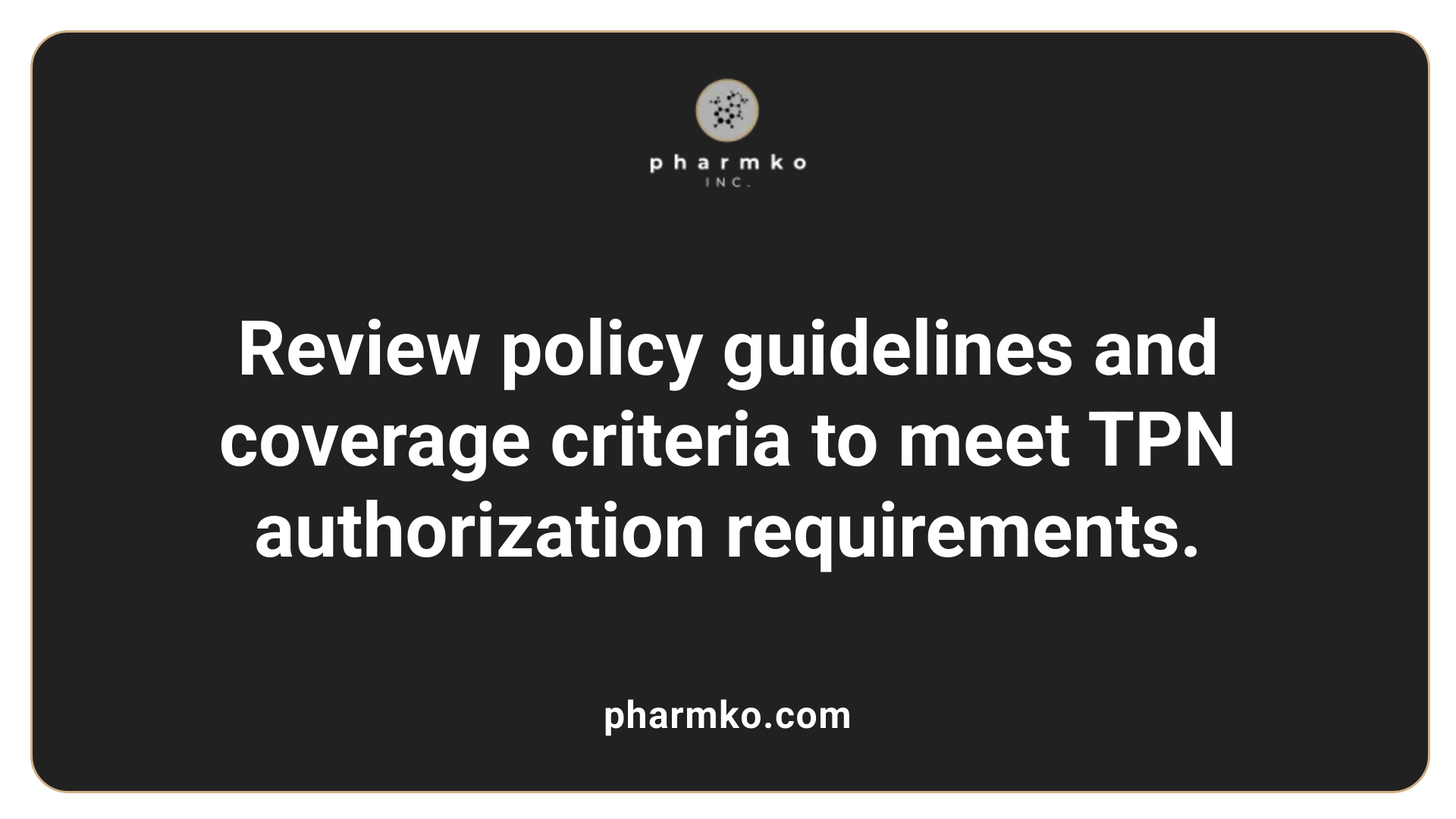
What are the medical policy guidelines and coverage criteria for TPN prior authorization?
Total Parenteral Nutrition (TPN) is a specialized form of nutritional therapy administered intravenously when patients cannot meet their nutritional needs through oral or enteral routes. Medical policies across various health plans set specific criteria that must be met to qualify for TPN coverage, especially in the home setting.
At the core of these policies is the requirement for substantial documentation demonstrating the medical necessity of TPN. This includes evidence of significant gastrointestinal issues that impair absorption of nutrients, such as severe malabsorption syndromes, or structural problems within the GI tract. It is also necessary to show that less invasive nutritional methods, like modified diets or pharmacotherapy, have been attempted but are inadequate.
Commonly, coverage is contingent upon confirming the failure or contraindication of enteral nutrition. This can be evidenced by an inability to receive more than 50% of caloric needs through enteral means, recent significant weight loss (for example, more than 10% of ideal or usual body weight over three months), or laboratory markers like serum albumin levels lower than 3.4 grams per deciliter. Patients who meet these criteria and have conditions such as Crohn’s disease, neurological disorders affecting swallowing, or severe bowel resection are typically eligible.
Coverage durations are generally limited during initial approval, often to 3 months, with possibilities for renewal up to a total of 6 months if the patient continues to meet the criteria and responds well to therapy. Continued approval requires ongoing review, including updated documentation on nutritional status, laboratory results, and clinical progress.
Healthcare providers must submit prior authorization requests via approved channels such as web portals, fax, or phone. These requests require detailed supporting documentation, including operative and hospital discharge reports, nutritional assessments, laboratory data, and physician certification of medical necessity.
In addition to the clinical documentation, plans also specify that solutions, supplies, and infusion equipment associated with TPN may be subject to prior authorization, and only providers contracted through specialized home infusion services are typically reimbursed for home TPN.
Regulatory compliance is critical. Coverage policies must conform to federal and state guidelines, including CMS rules for Medicare and Medicaid, and vary within different commercial plans. The policies aim to ensure TPN is used appropriately, reserved for patients who genuinely cannot maintain weight and nutritional balance using less intensive methods.
What specific patient conditions and diagnostic criteria are accepted for TPN coverage?
Eligible conditions under coverage policies include but are not limited to:
- Structural or functional gastrointestinal disorders impairing absorption, such as massive small bowel resection, fistulae, or congenital anomalies.
- Malabsorption conditions like Crohn's disease, Whipple’s disease, or chronic infectious enteritis.
- Functional disorders such as intestinal pseudo-obstruction or severe motility disturbances.
- Conditions necessitating bowel rest, including radiation enteritis or severe pancreatitis.
- Patients with inadequate nutritional intake due to gastrointestinal surgeries or obstructions.
- Certain neonatal or pediatric cases with failure to thrive due to specific diagnoses.
Diagnostic criteria often include markers like persistent significant weight loss, low serum albumin, or failure to meet caloric needs through oral or enteral means. Additional evidence like imaging, motility studies, or operative reports support these diagnoses.
How do regulatory compliance and plan-specific policies influence TPN coverage?
Regulatory standards established by CMS, FDA, and professional societies guide the eligibility criteria for TPN. These frameworks define the medical necessity thresholds and documentation required.
Plans may supplement these with their own policies to prioritize appropriate use and manage costs. For example, some plans specify maximum durations for initial authorization, often six months, with stipulations for recurring reviews to reassess continued need.
Documentation requirements and approval pathways can vary. Providers must adhere to plan guidelines, completing specific forms and providing comprehensive clinical data. Failure to comply with these policies can result in denials or delays.
Some plans, like AFMC, utilize dedicated review teams and electronic submission systems to streamline prior authorization. Reimbursements are aligned with Medicare Fee Schedules or billed charges, with some supplies bundled into per diem rates.
Overall, adherence to these policies ensures coverage aligns with current standards and promotes appropriate, safe, and effective use of TPN in eligible patients.
Documentation, Submission, and Procedural Requirements for TPN Approval
What are the documentation, submission, and procedural requirements for obtaining TPN approval?
When requesting approval for Total Parenteral Nutrition (TPN), healthcare providers must submit comprehensive documentation that clearly demonstrates the patient's medical necessity for this intervention. This includes detailed medical records that provide evidence of a significant gastrointestinal impairment or motility disorder which impairs intestinal absorption of nutrients. Conditions like massive small bowel resection, severe malabsorption, or bowel motility issues qualify when well-documented.
A critical component of the request is recent clinical evaluation. The physician evaluating the patient should conduct a thorough assessment within 30 days before initiating TPN. This evaluation must be documented and include a review of the patient's current clinical status, nutritional assessment, and the specific reasons TPN is considered necessary. If a recent assessment is not available, the provider must submit an explanation outlining the reasons and any interim monitoring methods used.
Supporting diagnostic or surgical reports strengthen the application, especially reports that confirm structural issues like fistulae, strictures, or extensive resections. These reports verify the diagnosis and justify the need for nutritional support beyond enteral methods.
Another vital requirement is the detailed justification of the patient's nutritional needs. This involves submitting documentation of caloric and nutrient calculations tailored to the patient, explaining deviations from standard nutritional ranges if necessary. Such justification helps reviewers understand the individualized approach to the patient's care.
Along with clinical data, providers need to submit a complete medical and nutritional assessment, including laboratory values such as serum albumin levels, weight trends over three months, and other relevant nutritional markers. These assessments help demonstrate ongoing nutritional compromise and support the case for home TPN.
Finally, a properly filled TPN request form must be submitted, including all required information such as patient identification, prescribing physician’s details, diagnosis codes, and signatures certifying the medical necessity. It is imperative that all forms are completed accurately to prevent delays.
Adherence to Medicare and other insurance coverage policies is essential. This covers proper use of modifiers, documentation of previous nutritional trials, and supply limitations. Proper submission ensures the application aligns with payer requirements, increasing the likelihood of approval.
In summary, the process involves detailed medical records, recent clinical evaluations, diagnostics, nutritional justification, and precise documentation. These steps are crucial for obtaining timely and appropriate approval for TPN, especially in outpatient and home care settings.
Regulatory and Policy Framework Governing TPN Prior Authorization
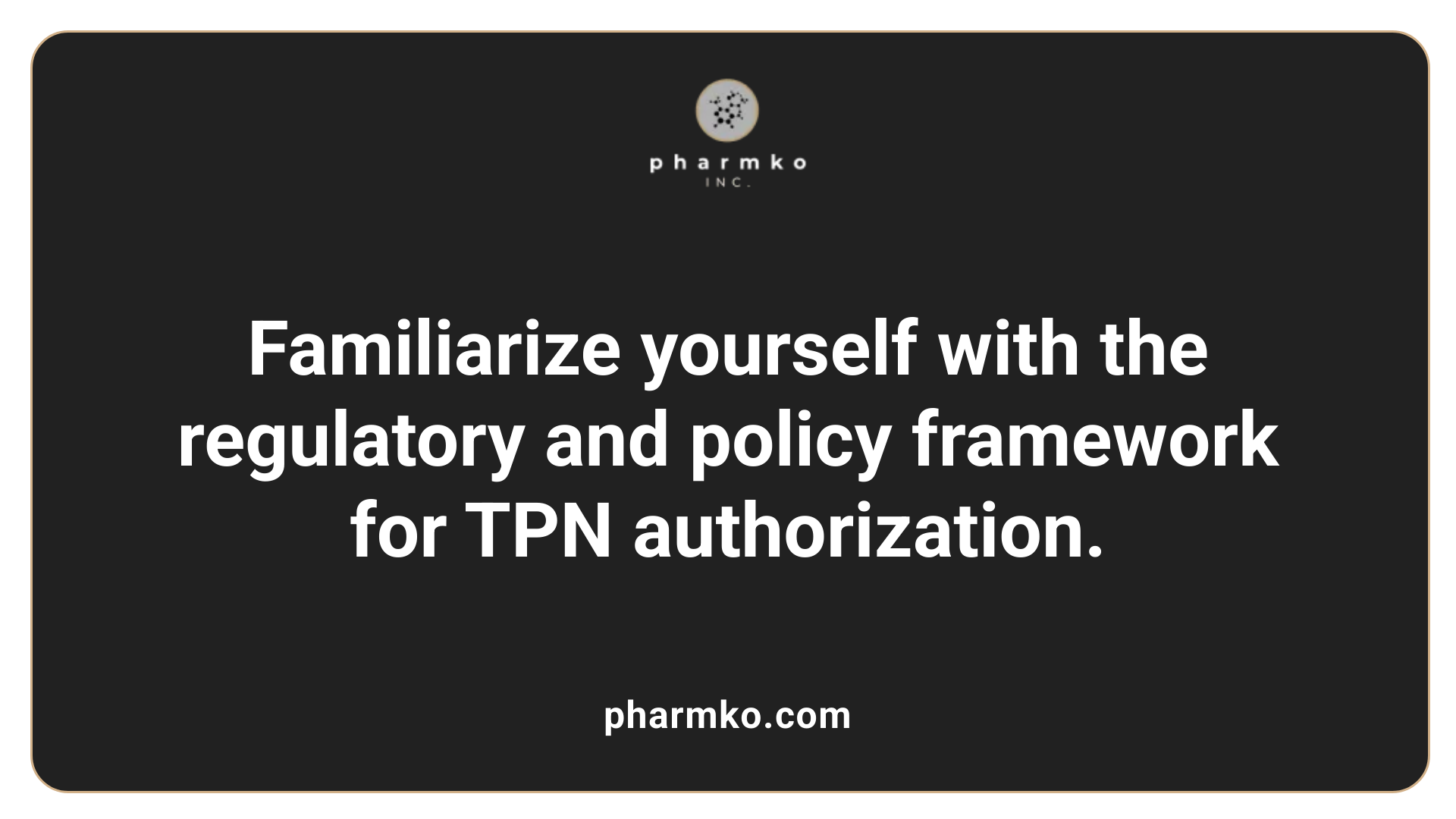
What is the regulatory and policy framework governing prior authorization for TPN?
The process of obtaining prior authorization (PA) for Total Parenteral Nutrition (TPN) is governed by a combination of federal regulations, state Medicaid policies, and professional guidelines. At the federal level, Medicare adheres to the National Coverage Determination (NCD) 180.2, which outlines the medical necessity requirements for specialized nutritional support, including TPN. This includes ensuring that beneficiaries have documented gastrointestinal impairments that prevent adequate absorption of nutrients and that less invasive methods have failed or are inappropriate.
State Medicaid programs, such as those in Oregon, follow specific administrative rules (e.g., Oregon Administrative Rules) that set criteria for coverage, documentation standards, and permissible durations for TPN therapy. These policies mandate comprehensive medical documentation, including operative reports, hospital discharge summaries, X-ray reports, small bowel motility studies, and serum albumin levels, to support claims of medical necessity.
Billing and coding regulations are also crucial components. Providers must use precise codes to ensure reimbursement, which include specific CPT codes for various formulations of TPN solutions, lipid emulsions, and related supplies. Accurate coding, often including modifiers, ensures compliance with federal and state billing standards. For instance, codes such as B4164, B4168, and B4172 are designated for different TPN formulations and their supplies.
The approval limits are typically set at a 60-day period per authorization, with extensions requiring review by a medical director or specialist. Longer-term use, such as lifetime therapy, generally demands more extensive review, including detailed medical records and justification. The process incorporates an appeals mechanism, where providers can seek reconsideration within 35 days of denial, with options for subsequent appeal through external review bodies.
Adherence to clinical guidelines from professional organizations like the American Society for Parenteral and Enteral Nutrition (ASPEN) and the European Society for Clinical Nutrition and Metabolism (ESPEN) further shapes policy. These organizations endorse strict criteria regarding indications for TPN use—for example, documenting severe malabsorption, bowel obstruction, or critical nutritional deficiencies.
Overall, the regulatory and policy environment aims to balance appropriate patient access with safeguards against unnecessary use, emphasizing thorough documentation, adherence to clinical indications, and compliance with billing regulations.
Authorization Codes, Forms, and Relevant Documentation for TPN Approval
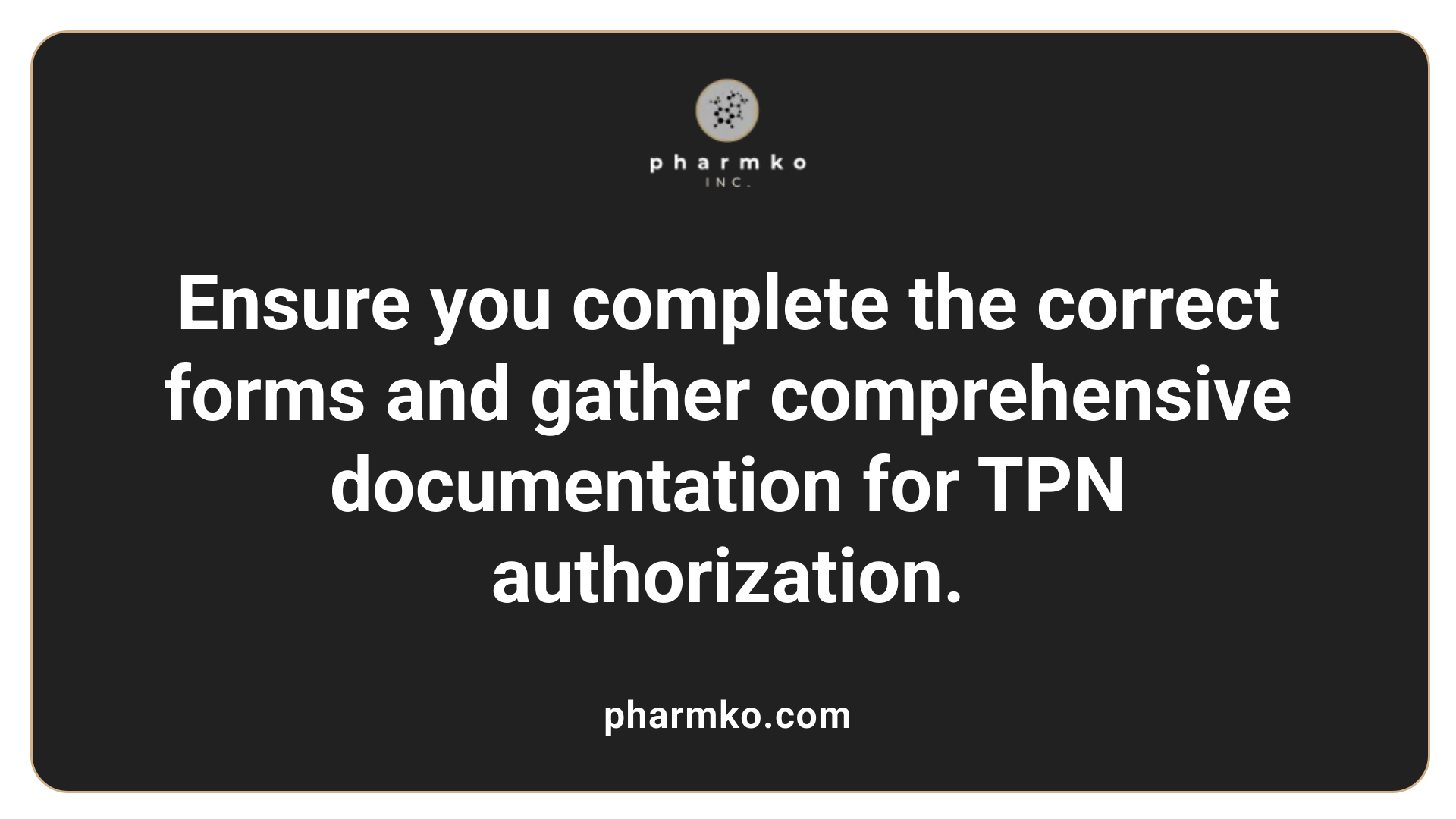
What authorization codes, forms, and relevant documentation are required for TPN approval?
Securing approval for total parenteral nutrition (TPN) involves multiple steps, including completing specific forms and providing comprehensive medical documentation.
The primary form required for Medicare patients is the CMS-10126, titled "Instructions for Completing the DME Information Form for Enteral and Parenteral Nutrition." This form is essential for documenting medical necessity and facilitating the authorization process. It guides providers through the necessary information needed to justify TPN, such as diagnosis, treatment plan, and supporting clinical evidence.
Although detailed authorization codes are not explicitly listed, the correct and thorough completion of this CMS-10126 form is crucial. It helps streamline the review process and ensures that all required information is available for decision-making.
In addition to the CMS-10126 form, providers must submit detailed medical documentation supporting the need for TPN. This includes hospital discharge summaries, operative reports, laboratory results such as serum albumin levels, and detailed notes from physicians and dietitians. Such documentation demonstrates that the patient has a gastrointestinal condition impairing absorption, has failed enteral nutrition, and cannot maintain nutritional status through other means.
Supply and equipment documentation also play a vital role. This includes physician orders for pumps and kits, certification of medical necessity, and records showing that the patient has been trained properly for home care. Documentation confirming the proper functioning and safety measures for infusion pumps, storage kits, and other related supplies are required to validate the ongoing need for specialized equipment.
For claims submission, providers generally use CMS-1500 forms, incorporating the appropriate billing codes for various TPN solutions, components, and supplies. These codes include specific formulations like B4164, B4168, B4172, and others, each corresponding to different nutritional compositions and associated supplies.
Claims submission guidelines
Providers should ensure precise and complete documentation accompanying claims. This includes detailed physician orders, certification of medical necessity, and all supporting clinical data. Submitting claims electronically via Medicare's portal or through approved billing platforms like Surescripts or CoverMyMeds can expedite approval, especially when integrated with prior authorization systems.
In urgent situations or for extended therapy, providers may need to seek pre-approval or authorization renewal, which involves submitting updated documentation justifying the continuation of therapy.
In summary, obtaining approval for TPN requires meticulous preparation of the CMS-10126 form, comprehensive medical documentation, accurate coding, and adherence to claims guidelines. These steps are vital to ensuring timely access to essential nutritional therapy for eligible patients.
Step-by-Step Guide for Healthcare Providers to Navigate Prior Authorization for TPN
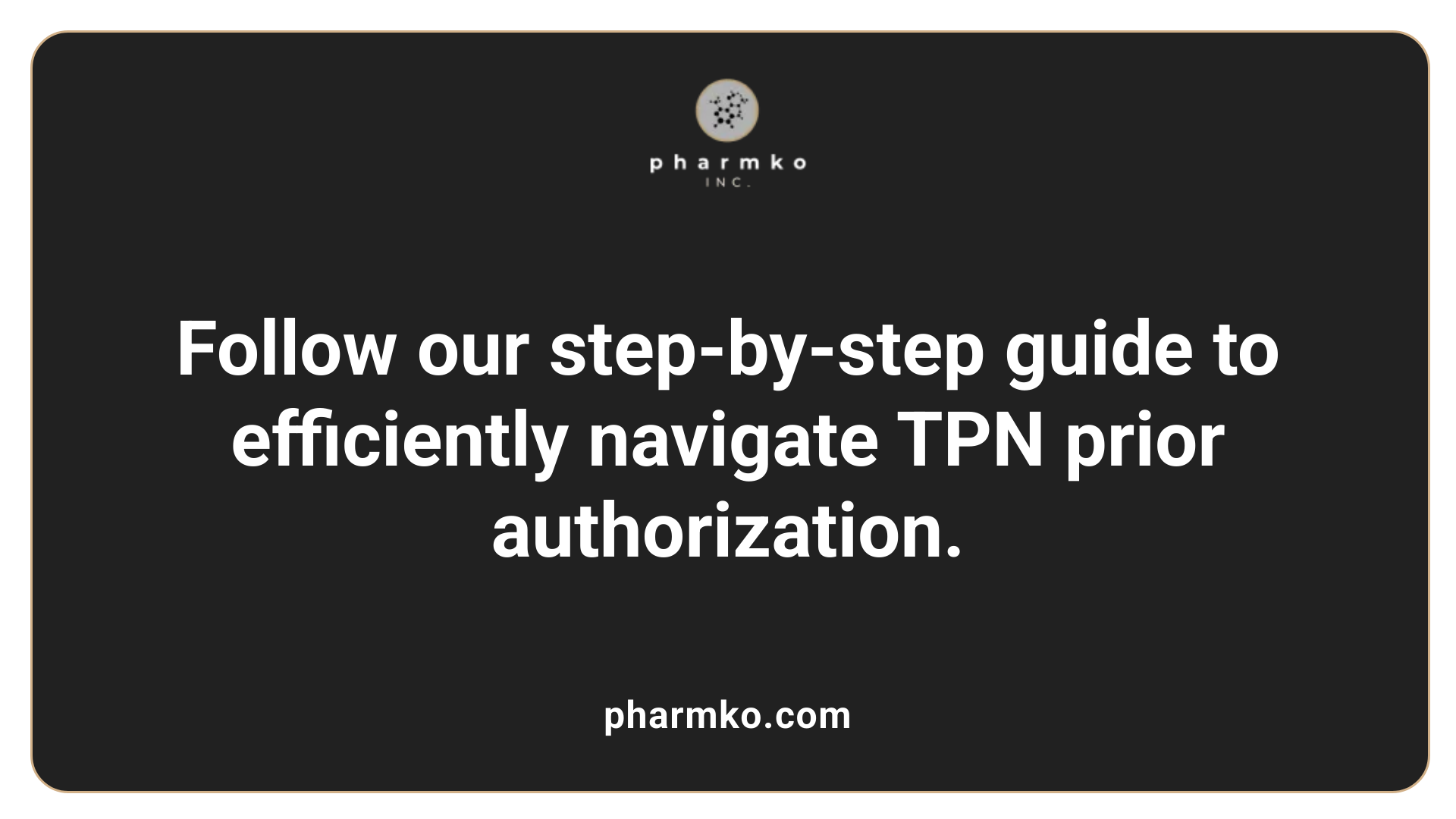
What is the step-by-step process for healthcare providers to navigate prior authorization for TPN?
Navigating the process of obtaining prior authorization (PA) for Total Parenteral Nutrition (TPN) involves several organized steps to ensure timely access and proper coverage.
The first step is completing the designated PA request form. Providers can choose to submit this request electronically through approved online portals such as CoverMyMeds® or Surescripts®, both offering streamlined and rapid submission options. Alternatively, providers can submit a hardcopy request by FAX, using the specific form provided for TPN authorization, to the designated fax line at 1-888-671-5285.
It is critical that all required information is accurately entered into the request form. This includes patient details, diagnosis, date of initial infusion, provider certification of medical necessity, and a detailed explanation supporting the clinical indication for TPN. Including documentation such as operative reports, hospital discharge summaries, laboratory results, and nutritional assessments significantly aids the review process and reduces the chance of delays.
Once the request has been submitted, providers should wait for a response indicating approval or denial. Typically, the processing time is within two business days, with notifications delivered by fax or electronically. If the provider does not receive a response within this timeframe, it is advisable to follow up by contacting the pharmacy benefits manager directly through the call center.
The contact number for status inquiries is 1-888-678-7012. During this call, providers can request an update on the request status, clarify any issues, or provide additional documentation if needed.
After receiving approval, healthcare providers can proceed to prescribe and administer TPN according to the outlined plan. It is essential to follow all safety protocols, dosing guidelines, and documentation requirements to ensure continuous and authorized nutritional support.
This process aims to streamline access to TPN while ensuring compliance with medical necessity criteria and payer policies, ultimately supporting patient health and safety.
Ensuring Compliance and Patient Safety in TPN Authorization
Efficient coordination of prior authorization for TPN hinges on thorough documentation, adherence to clinical guidelines, and proactive communication among providers, insurers, and regulatory agencies. Understanding the process, meeting coverage criteria, and complying with procedural requirements are essential for timely therapy initiation. As regulatory frameworks evolve, advocating for streamlined processes remains vital to minimize delays, reduce administrative burdens, and ensure that patients receive the nutrition support they need without undue disruption.
References
- [PDF] Total Parenteral Nutrition (TPN) in the Home Setting - PacificSource
- [PDF] Parenteral nutrition prior authorization requirement changes ...
- [PDF] Total Parenteral Nutrition (TPN) in the Home Setting - PacificSource
- Prior authorization | Providers | Independence Blue Cross (IBX)
- [PDF] Pharmacy Medical Policy - Home Total Parenteral Nutrition (TPN)
- [DOC] APP.37.5.10.TPN.xxxx20.docx
- [PDF] Fee-For-Service Provider Billing Manual Chapter 8 Prior ... - AHCCCS













